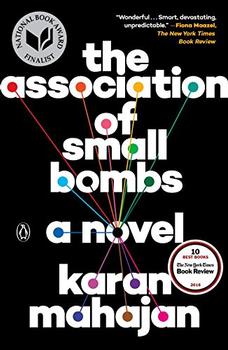Summary | Excerpt | Reviews | Beyond the Book | Read-Alikes | Genres & Themes | Author Bio

Critics' Opinion:
Readers' Opinion:
First Published:
Mar 2016, 288 pages
Paperback:
Oct 2016, 288 pages
 Book Reviewed by:
Book Reviewed by:
Kim Kovacs
Buy This Book
This article relates to The Association of Small Bombs
In The Association of Small Bombs, the 2002 Gujarat Riots become the rationale for a bombing as terrorists seek revenge against then Chief Minister (and current Indian Prime Minister) Narendra Modi.
The incident began in the western Indian state of Gujarat on February 27, 2002. A train carrying Hindu pilgrims was parked at a station near Godhra, a city already known for religious tensions between its Hindu and Muslim citizens. Hindu activists began chanting religious slogans which attracted a crowd of Muslim protesters. A fight broke out between the groups and was quelled, but about 15 minutes later a fast-moving fire erupted in the train, resulting in the deaths of 59 people including 25 women and 25 children.
Modi claimed the fire was the work of local Muslim terrorists sponsored by Pakistan, although there was no evidence for the accusation. There are conflicting theories, and the most commonly accepted one is that the fire was started by the mob that attacked the train.
On February 28 three days of coordinated attacks against Gujarat's Muslim population began, which many claimed had been instigated by Modi. Men wearing saffron robes and khaki shorts arrived in trucks at multiple cities throughout the state and proceeded to destroy Muslim businesses and places of worship, and to rape and kill hundreds of Muslim men, women and children.
Police didn't intervene, and it was only on March 1 that the army arrived to control the situation after most of the damage had been done and the violence was dying down. Attacks continued, however, for the next two to three months. When all was said and done, over 1,000 people were dead, 20,000 Muslim homes and businesses destroyed, 360 places of worship demolished, and some 150,000 residents of Gujarat displaced.
Modi was widely criticized for failing to protect his citizens and ignoring the situation for three days. He was nevertheless re-elected later in 2002, running on a platform of Hindutva ("Hindu-ness"), uniting the region's Hindu population around a fear of Muslims. During his campaign he frequently spoke about the pilgrims who died in the train fire but never mentioned the Muslims who were killed in subsequent riots. Widely condemned by the international community for not stopping the riots, the United States banned him from the country from 2002 – 2014.
Modi remained popular in India, however, and was re-elected again in 2007 and 2012 and became Prime
Minister in 2014, pointing to his home state of Gujarat as a shining beacon of prosperity (the state economic output grew during Modi's time as Chief Minister). Multiple inquiries have been conducted in India but Modi was never charged with any crime. The Supreme Court twice appointed a "Special Investigation Team" (SIT), that interviewed witnesses and gave a report on whether there was enough evidence to bring Modi to trial. They concluded there was not.
The most serious claim against Modi is that he withheld police protection, and that he later retaliated against police officers who tried to intervene or who gave evidence to help the victims. But this claim was never followed through. The police in Gujarat report to the Chief Minister, so it would be difficult.
In 2012, ten people, including one former cabinet minister in Modi's cabinet and a leader of Bajrang Dal (a militant Hindu organization), were convicted of a role in the riots and charged. Prosecutors requested the death sentence during the sentencing phase.
Filed under People, Eras & Events
![]() This article relates to The Association of Small Bombs.
It first ran in the May 18, 2016
issue of BookBrowse Recommends.
This article relates to The Association of Small Bombs.
It first ran in the May 18, 2016
issue of BookBrowse Recommends.





The Funeral Cryer by Wenyan Lu
Debut novelist Wenyan Lu brings us this witty yet profound story about one woman's midlife reawakening in contemporary rural China.
Your guide toexceptional books
BookBrowse seeks out and recommends the best in contemporary fiction and nonfiction—books that not only engage and entertain but also deepen our understanding of ourselves and the world around us.